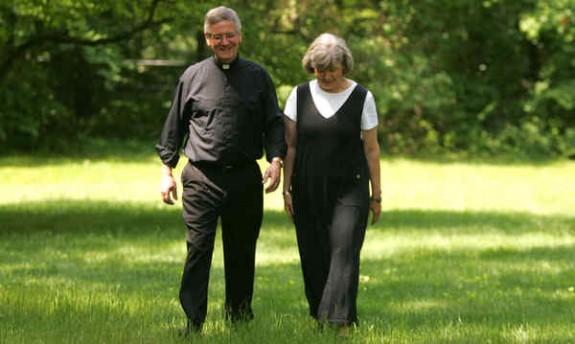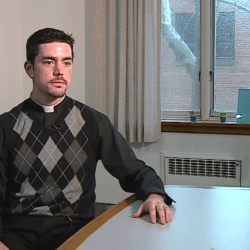An alert reader sent this my way: another interesting voice, from Sean Connelly, in the debate over a celibate priesthood:
It was recently my distinct displeasure to be roped into a debate about whether, under Canon Law, married deacons in the Latin Rite have an obligation to observe “perfect and perpetual continence.” Those arguing in favour of the obligation were remarkably passionate. One young lady even went so far as to say that she and her husband avoided liturgies officiated (she might have said “polluted”) by married clergy. They were also tenacious. No curial statement or pontifically sanctioned norms of formation could make them shut up, nor did brotherly love seem to urge them to adopt prudent cease-fire (or even to lighten their tone) in the interest of preserving the emotional health of the deacons and their wives that were involved in the discussion, the most intimate aspect of whose lives was being made the subject of a prolonged and often vicious public scrutiny.
The persistence with which many of these people pressed the issue leads me to think that their interest in the matter is hardly academic. This particular point of Canon Law instead seems to have presented them with an opportunity to attack and, in the right academic circles, attempt to destroy an institution which they view with disdain, a sexually active married clergy in the West.
Why such aversion?
Most people enjoy sex, but most people do not respect it. They view it as a guilty pleasure, even when it is legitimate. The primary end of marriage becomes for them a kind of constant reminder of their own imperfection. That they desire sex for something more than the propagation of the human race, and that they enjoy more about it than the pleasant hopes it conjures of little voices round about the hearth, bothers them. As a cure for concupiscence it is tolerable: as an expression of love it is unthinkable.
When they consider the possibility of a married clergy, then, they have to view it as a kind of concession to human weakness. Clergy should, as leaders of the community, be of exceeding holiness. As such, they reason, they should be able to refrain from such base things as sexual relations…
…A sacramental marriage is a type of Christian common life, a vocation, and a path to holiness. It is a sacred partnership, and it is directed in all instances, even if it should prove unfruitful and fail to attain its primary end, towards the sanctification of husband and wife. It is a friendship in the truest sense of the word, for if, as Plato says, “The things of friends are held in common,” what deeper friendship can exist than that in which two people hold their entire lives, their possessions, and even their bodies in common?
How, then, does a married priest conceive of his marriage as it relates to his ministry? Is it a concession which he is permitted for his weakness, or does it constitute an integral part of his vocation?
In the Eastern Churches, it is common to call a priest’s wife, “Reverend Mother,” and to hold her as a kind of mother of the parish. She is considered a real partaker in her husband’s ministry, and she is more often than not highly involved in the day to day running of parish affairs, giving of her own time as generously as her husband does.
Isn’t this the ideal Christian marriage? In collaborating in the care of the parish, the priest and his wife come as close as any married couple can to a total sharing of life and unity of purpose. In supporting one another, they support the life of the Church. In raising their family, they provide an example and model for the entire parish, and their children are able to grow up in an environment that is completely dedicated to the service of God, carrying with them throughout their entire lives the indelible mark on their characters of having been the sons and daughters of a priest.
If it is done right, a priest’s marriage is anything but a distraction from his ministry, and, so far from a concession to his weakness, it can be one of his greatest sources of strength.
Read it all. Check out the comments, as well.












